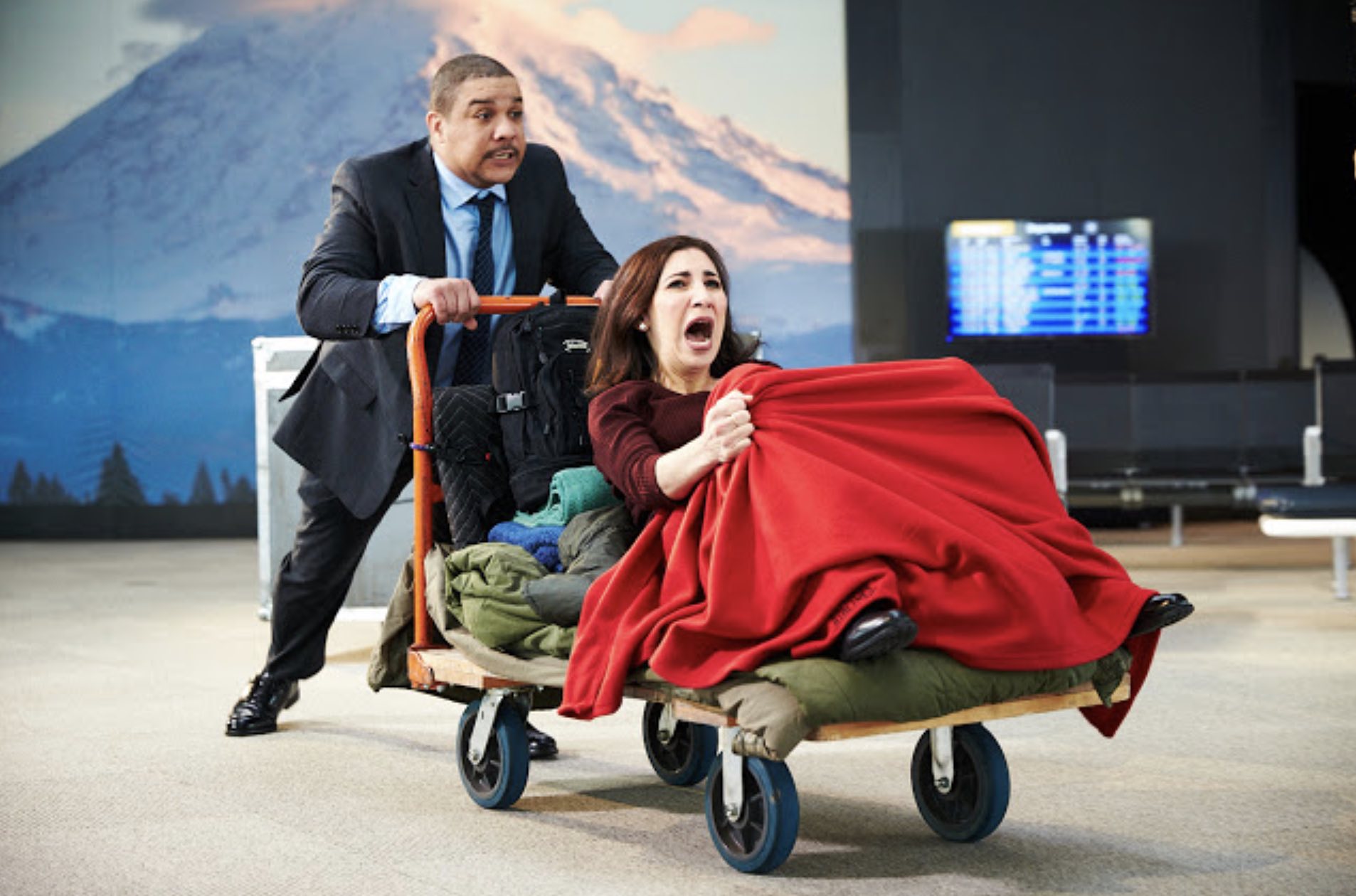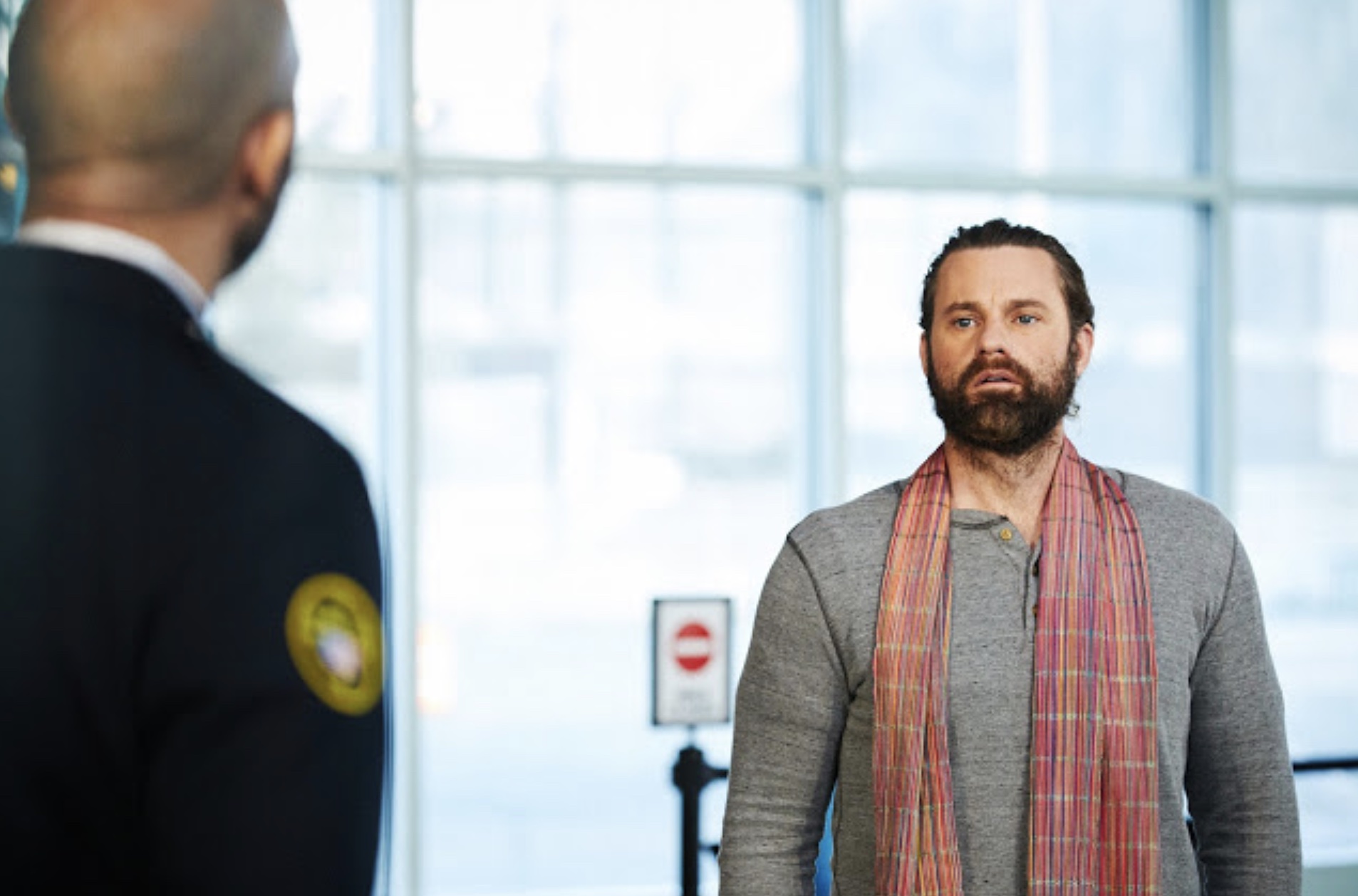Reviews
Seattle's Museum of Flight as Optimal for Jonathan Dove's Opera Flight
Pandemic programming has encouraged opera companies to reinvent themselves as TV or movie producers, but few have been as ingenious or as apposite as Seattle Opera with its new film of Jonathan Dove’s Flight. Written in 1998 by British composer Dove and librettist April De Angelis for Glyndebourne, the work is that rara avis, a contemporary opera that seems to have genuinely entered the repertoire, particularly in English-speaking countries where its quirky humor is most readily appreciated. Its Seattle Opera debut is the first time it has been reimagined for the screen.
Flight takes place over 24 hours in a busy airport terminal governed by an icy, rule-bound controller, a pair of over-sexed flight attendants, and an eagle-eyed immigration officer. Among the passengers are Bill and Tina, a couple hoping to rekindle their sex life on a sun-drenched holiday, a middle-aged woman eager to rendezvous for the first time with her 22-year-old overseas fiancé, and a diplomatic appointee and his heavily pregnant wife en route to Minsk (appropriately known as Minskman and Minskwoman). Into the mix Dove and De Angelis throw a refugee trapped in the terminal building without papers, a character inspired by Mehran Karimi Nasseri, an Iranian refugee who lived in a departure lounge at Paris’s Charles de Gaulle Airport from 1988 until 2006 (the same story that inspired Spielberg’s 2004 movie The Terminal).
 Aubrey Allicock (Minskman) and Karin Mushegain (Minskwoman) in Flight
Aubrey Allicock (Minskman) and Karin Mushegain (Minskwoman) in Flight
An unexpected electrical storm is the deus ex machina here, stranding this disparate bunch together overnight. Airports are normally transient places. People come and go, full of hopes, dreams and fears, and the last thing anyone wants is to be bothered by others. But circumstances force them to confront ideas of community, isolation, love, acceptance, and social stigma.
Dove’s score is a lyrical delight; sharp, funny, colorful, and fueled by the kind of expanded minimalist musical language that drives John Adams’s earlier stage works. It’s catchy too, with melodic phrases that lodge in the brain and an addictive rhythmic energy that culminates in bursts of musical adrenalin. Imaginative use of tuned percussion adds a dash of enchantment to it all, in particular to the scene where the refugee offers each of the women a “magic” stone in the hope of securing their help later to hide him from the authorities.
The ideal arts-community collaboration
Seattle Opera’s stroke of genius was to film the work at the city’s Museum of Flight, including within exact replicas of a control tower and a departure lounge. Occasional shots of historic aircraft suspended in the museum’s six-story main gallery suggest a romantic realm of airborne adventure beyond the mundane world of check-ins and security desks. Brian Staufenbiel’s direction, with film direction and editing by Kyle Seago, is astute and effective. Filmed between February 22 and March 6 this year, the camerawork is excellent with split screens making perfect sense out of conventional operatic asides and ensembles. Viswa Subbaraman’s musical direction is spot on, punchy when it needs to be but allowing plenty of room for orchestral and vocal light and shade. Recorded separately, the sound is first-class, though occasionally dodgy lip-synching takes a bit of getting used to.
 There isn’t a weak link in the cast, with outstanding diction rendering the subtitles almost unnecessary. American countertenor Randall Scotting is marvelous as the Refugee, his plangent, rich-toned instrument possessing just the right degree of otherworldliness to suggest his mysterious origins and the complexities of his unique dilemma. He’s a compelling actor as well, which ensures that his final aria and its dramatic reveal (no spoilers) lands with due pathos. He’s well matched by the fearless coloratura of Canadian soprano Sharleen Joynt who delivers a glittering tour de force as the icy Controller. Meticulous and contained, she stamps out misdemeanors from her all-seeing vantage point with a ruthless and chilling efficiency.
There isn’t a weak link in the cast, with outstanding diction rendering the subtitles almost unnecessary. American countertenor Randall Scotting is marvelous as the Refugee, his plangent, rich-toned instrument possessing just the right degree of otherworldliness to suggest his mysterious origins and the complexities of his unique dilemma. He’s a compelling actor as well, which ensures that his final aria and its dramatic reveal (no spoilers) lands with due pathos. He’s well matched by the fearless coloratura of Canadian soprano Sharleen Joynt who delivers a glittering tour de force as the icy Controller. Meticulous and contained, she stamps out misdemeanors from her all-seeing vantage point with a ruthless and chilling efficiency.
As Tina in search of a renewed sex life with husband Bill, Karen Vuong’s clarion soprano is complemented by the honeyed yet powerful tenor of Joshua Kohl. Between them they do a neat job of illuminating the ups and downs of a careworn relationship governed by the precepts contained in a well-thumbed copy of The Joy of Sex. When Tina chides Bill with being afraid to experiment in the bedroom, the dénouement, involving a mix-up and a pair of trousers, is delicious. Karin Mushegain as Minskwoman is another standout. Her clean, clear soprano is stirring and affecting by turns and she neatly captures the character’s initial confusion and subsequent inability to get on her flight. Wide-eyed baritone Aubrey Allicock manages the about face as her husband Minskman who accidentally jets off alone in Act One, returning the next day just in time for the delivery of their baby.
Mezzo-soprano Margaret Gawrysiak displays a succulent lower register and puts in a touching, if sometimes larger than life performance as the older woman. As the racy flight attendants, soprano Sarah Larsen and baritone Joseph Lattanzi do a sterling job of maintaining the fixed smiles as they go through the professional motions, with Damien Geter revealing a resonant bass as the immigration officer in the third act confrontation.
At a time when many might have forgotten the joys and frustrations of air travel, Flight is both a reminder of less locked down times and an example of how opera can thrive on film.
Flight is available to season ticket holders now and streams on Seattle Opera’s website April 23–25.
Bottom photo: Randall Scotting as the Refugee
Photos by Philip Newton





 FEATURED JOBS
FEATURED JOBS

 RENT A PHOTO
RENT A PHOTO


